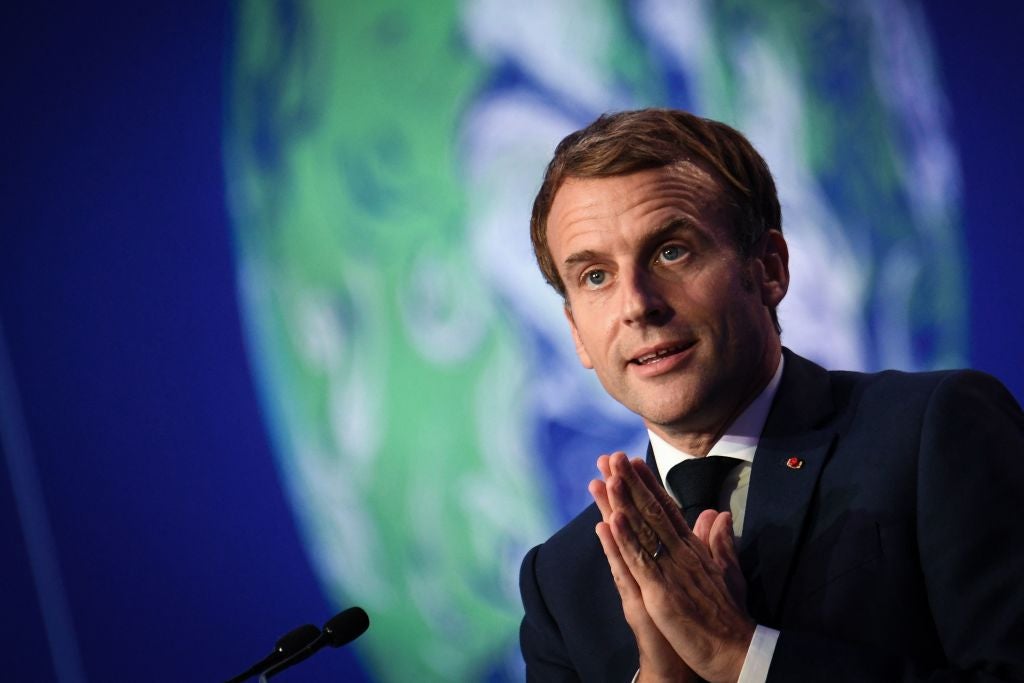Once upon a time, a big package of draft EU climate legislation coincided with a French EU presidency and a war waged by Russia. What’s more, eastern European member states were sharply resisting the EU’s green ambitions and the global economy was in crisis.
Sound familiar?

The scenario currently faced by French President Emmanuel Macron confronted one of his predecessors – Nicolas Sarkozy – in 2008, when France last held the rotating six-month presidency of the Council of the EU, which represents the EU 27.
Sarkozy forged a landmark European climate accord and played a leading role in mediating an end to a Russian military attack against Georgia. At the time, Poland was spearheading opposition to planned EU cuts in greenhouse gas emissions and the bloc was tumbling into recession in the wake of worldwide financial disruptions triggered by the bursting of a US housing bubble.
The French success in Europe almost 14 years ago offers lessons for Macron, who is seeking to secure a second term later this month and – if he succeeds – will steer EU legislative business until the end of June amid Russia’s illegal, brutal invasion of Ukraine and serious economic headwinds.
Macron won the first round of France’s presidential election on 10 April without gaining a majority of the vote, setting up a runoff against far-right challenger Marine Le Pen on 24 April.

US Tariffs are shifting - will you react or anticipate?
Don’t let policy changes catch you off guard. Stay proactive with real-time data and expert analysis.
By GlobalDataRegardless of whether the EU opts to expand its unprecedented sanctions against Russia by restricting imports of oil and natural gas from the country, the conflict in Ukraine gives the EU’s climate agenda fresh impetus that Macron should seize.
Rare alignment
At issue when Sarkozy was France’s head of state were the EU’s first proposed green targets for 2020. At stake now, as global warming accelerates, are proposed upgraded European climate goals for 2030.
Sarkozy secured EU agreement on three bloc-wide targets for 2020: a 20% reduction in greenhouse gas emissions (compared with 1990 levels), a 20% share of renewable energy and 20% energy savings.
Macron has the job of advancing nine-month-old European Commission proposals to make more ambitious EU goals for 2030 in the same three key areas. The ‘Fit for 55’ package on the negotiating table in Brussels would slash EU emissions by 55% rather than by just 40%, boost renewables to 40% from a current 32% target and increase energy savings to at least 36% from an existing 32.5% objective.
The draft laws are meant to propel a transition toward clean energy across the EU, put the bloc on track for net-zero emissions in 2050 and encourage the rest of the world to follow suit before critical climate change thresholds are crossed.
In short, this is about the EU remaining a leader when it comes to the fight against global warming.
Russia's war against Ukraine has created a clear – and hitherto rare – alignment of the EU's geopolitical interests with its climate goals. The case for European energy independence through a speedier deployment of renewables such as solar and wind power is overwhelming – a true turning point.
Since taking office in 2017, Macron has repeatedly urged more EU strategic autonomy by expanding European industrial alliances, defense cooperation and trade powers.
[Keep up with Energy Monitor: Subscribe to our weekly newsletter]
But, early in his term, Macron also argued forcefully for greater European climate ambition. The appeal was all the more powerful given that then US President Donald Trump, translating his “Make America Great Again” pledges into actions, was recklessly dismissing the global climate threat.
“Make our planet great again,” Macron said on the day in 2017 that Trump decided to withdraw the US from the landmark 2015 Paris Agreement to fight global warming. “Climate change is one of the major issues of our time.”
With the EU's reliance on Russian oil and gas more unpalatable than ever, Macron has every reason to push for a climate package that is even more ambitious than what the Commission has proposed. This is especially true for the 2030 renewables and energy efficiency targets.
Absent leadership
Yet, more than three months into its EU presidency, the French government has shown no such intention.
Instead, Paris has sent warning signals about another part of the EU package – a proposal to put buildings and road transport in a distinct European emissions trading system. Although unease about a possible popular backlash from such a consumer-facing market tool is understandable, France should be focusing minds on how best to lower emissions in these two sectors – long spared needed climate regulation – while ensuring social fairness.
A French domestic political difference between 2008 and 2022 is that Sarkozy had taken office the year before whereas Macron is running for re-election smack in the middle of France's stint at the EU helm.
But now is no time to become shy about the EU's green ambitions. Climate protection has become an even greater global priority and Macron has sought to take political advantage of a grassroots green wave across Europe.
As he actively engages in personal diplomacy to help end the war in Ukraine, Macron can also be a statesman on matters closer to home by pushing with determination for EU strategic autonomy in energy.



